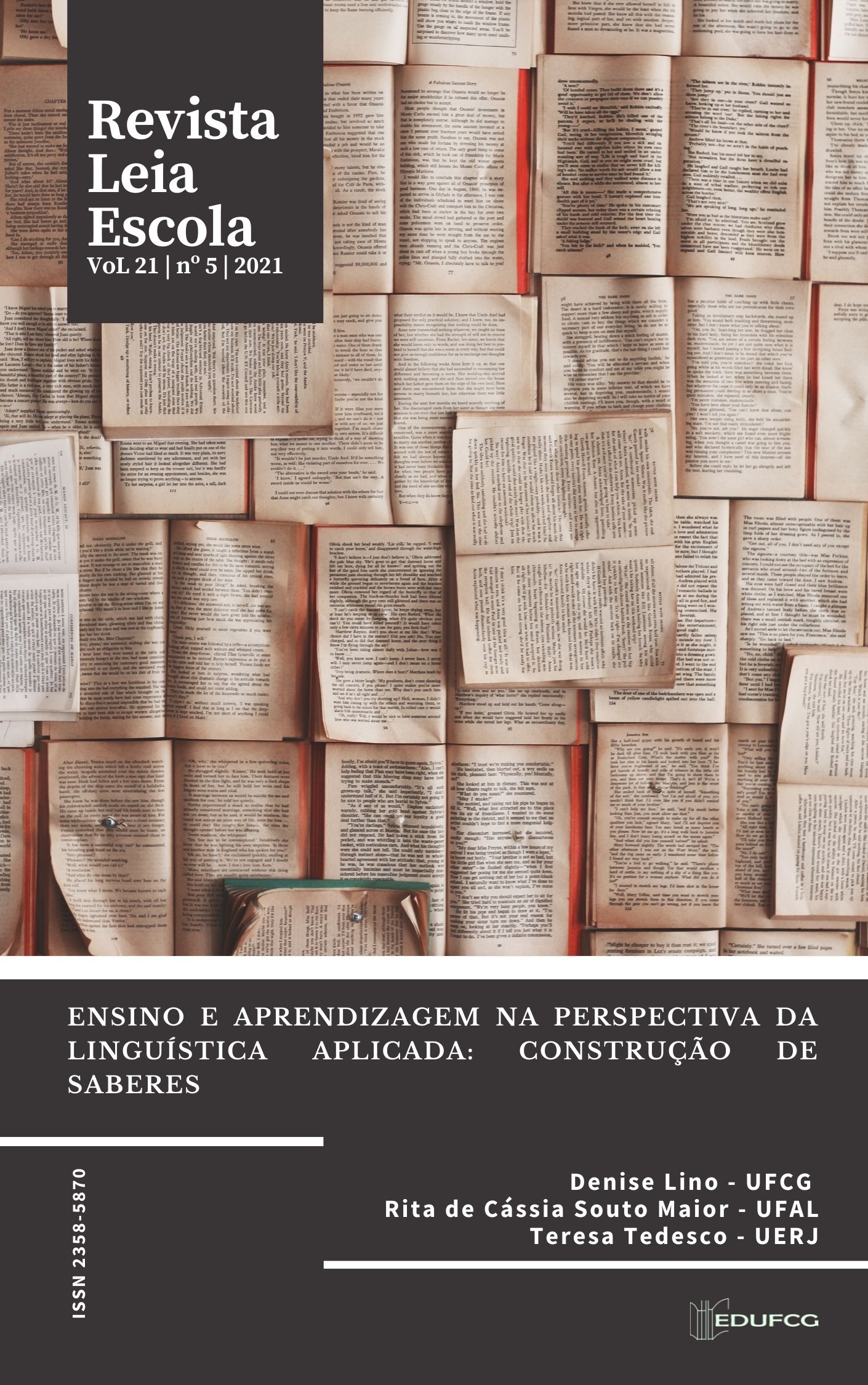POETRY IN LANGUAGE CLASS
DEVELOPING LINGUISTIC KNOWLEDGE USING LITERATURE FOR LITERATURE'S SAKE
Keywords:
Foreign language teaching, Literature, PoetryAbstract
Language learning through literature dates to the teaching of classical languages, with the grammar-translation method. Years after the consensus on the limitations of this method, the use of literature in language classes is still very similar to that of those times. Today, studies such as those by Duff and Maley (1990) and Babaee and Yahya (2014) point to a more conversational use of literature, emphasizing its various cognitive, cultural, and communicational aspects. The purpose of this research is to survey the theories that support this communicative use of literature in the classroom and, in the end, to analyze data on the experience of putting such views into practice. The results show that teachers can help learners improve their language skills by using the vast possibilities of literature while talking about existential, cultural, historical, and poetic themes of literary texts.
Downloads
References
BABAEE, R.; YAHYA, W. R B. W. Significance of Literature in Foreign Language Teaching. International Education Studies v. 7, n. 4, p. 80-85, 2014. Available at: http://dx.doi.org/10.5539/ies.v7n4p80. Accessed on: 22 Feb. 2021.
BALBONI, P. E. Translation in language learning: a 'what for' approach. EntreLínguas, v.3, n.2, p. 276-299, 2017.
BLAKE, W. The Complete Works. London: Penguin Books; Illustrated edition. 1978.
BOBKINA, J; DOMINGUEZ, E. The use of literature and literary texts in the EFL
classroom: Between consensus and controversy. International Journal of Applied Linguistics & English Literature, v. 3, n. 2, p. 248-260, 2014.
BUTLIN, R. BritLit: Using Literature in EFL Classrooms. London: APAC, 2009.
DICKINSON, E. Selected Poems. New York: Dover Publications, 2014.
DUFF, A.; MALEY, A. Literature. Oxford: Oxford University Press, 1990.
FERNANDES, L. Using English Literature for the teaching of English. International Journal of English Language and Literature Studies, v. 3, n. 2, p. 126-133, 2014. Available at: http://www.aessweb.com/journals/5019. Accessed on: 22 Feb. 2021.
FROST, R. The Road Not Taken: And Other Poems. New York: Dover Publications, 2014
FIGUEIREDO, F. J. Q. de. Aprendendo com os erros: uma perspectiva comunicativa de ensino de línguas. 3. ed. rev. ampl. Goiânia: Ed. UFG, 2015.
FIGUEIREDO, F. J. Q. de. (org.). A aprendizagem colaborativa de línguas. 2. ed. rev. ampl. Goiânia: Ed. UFG, 2018.
FIGUEIREDO, F. J. Q. de. Vygotsky: a interação no ensino/aprendizagem de línguas. São Paulo: Parábola, 2019.
FIGUEIREDO, F. J. Q. de; OLIVEIRA, E. C. de. Sobre métodos, técnicas e abordagens. In: FIGUEIREDO, F. J. Q. de. (org.). Formação de professores de línguas estrangeiras: princípios e práticas. Goiânia: Ed. UFG, 2012. p. 11-40.
GUZMAN, J. R.; ALCÓN, E. Translation and language learning: AlfraCovalt as a tool for raising learners' pragmalinguistic and sociopragmatic awareness of the speech act of requesting. Horizontes de Linguistica Aplicada, v. 8, n. 2, p. 238-254, 2009.
FRYE, N. The educated imagination. Indiana: Indiana University Press, 1964.
HARMER, J. How to Teach English. Oxford: Pearson Education Longman. 2001. Available at: https://www.academia.edu/29550207/How_to_Teach_English_2nd_Editio
n_Jeremy_Harmer. Accessed on: 3 Jan. 2020.
HEALY, S. Literature in EFL Classroom: From theory to practice. AHSUSK HS, v. 42, p. 178-191, 2010.
JOHNSON, D. M. Approaches to Research in Second Language Learning. New York: Longman, 1992.
LARSEN-FREEMAN, D. Techniques and principles in language teaching. Shangai: Oxford University Press, 2000.
LIMA, A. K. C. Literatura no ensino/aprendizagem de língua inglesa: formação da consciência linguística e crítica. 2020. 174 f. Dissertação (Mestrado em Educação) - Universidade Federal de Goiás, Jataí, 2020.
MCKAY, S. Literature in the ESL Classroom. TESOL Quarterly, v. 16, n. 4, p. 529-536, 1982. Available at: https://www.jstor.org/stable/3586470. Accessed on: 3 Jan. 2020.
POE, E. A. Collected Stories and Poems. London: Collector's Library Edition, 2012.
PONTES, V. O.; LOPES, A. L. C.; BERENBLUM, A. S. Tradução, ensino de línguas e o uso do gênero textual poema como instrumento para a aprendizagem da língua espanhola como língua estrangeira. Miguilim. v. 9, n. 3. p. 802-819, 2020.
PONTES, V. O.; SOUSA, B. B. A. A. L.; SILVA, R. F. Tradução e ensino de língua estrangeira: uma agenda de pesquisa dos anos de 2004 a 2013. Cadernos de Tradução, v. 35, n. 2, p. 260-288, 2015.
POUND, E. ABC da Literatura. São Paulo: Editora Cultrix, 1970.
SAPPHIRE. Push. New York: Vintage, 1996.
SHAKESPEARE, W. The Complete Works of William Shakespeare. New York: Barnes & Noble, 1994.
SWAIN, M. Languaging, agency and collaboration in advanced second language learning. In: BYRNES, H. (ed.). Advanced Language Learning: The Contributions of Haliday and Vygotsky. London & New York: Continuum, 2006. p. 95-108
VASUHI, R. Humanism: A Human Perspective in English Language Teaching, 2011. This paper was presented at the International Seminar on Humanistic Language and Literature Teaching on February 18th & 19th, 2011, organized by The Anna University, Chennai. Available at: http://www.tjells.com/article/54_HUMANISM.pdf. Accessed on: 20 Feb. 2021.
VYGOTSKY, L. S. A formação social da mente: o desenvolvimento dos processos psicológicos superiores. São Paulo: M. Fontes, 1998.
WILLIAMS, K., & WILLIAMS, C. Five key ingredients for improving motivation. Research in Higher Education Journal, n. 11, p. 1-23, 2011. Available at: http://aabri.com/manuscripts/11834.pdf. Accessed on: 30 Jun. 2021.
YOUNG, D. J. Creating a low-anxiety classroom environment: What does language anxiety research suggest? The Modern Language Journal, v. 75, n. 4, p. 426-439, 1991. Available at: http://www.jstor.org/stable/329492. Accessed on: 25 Jan. 2021.
Downloads
Published
How to Cite
Issue
Section
License
Copyright (c) 2024 Revista Leia Escola

This work is licensed under a Creative Commons Attribution-NonCommercial-NoDerivatives 4.0 International License.



